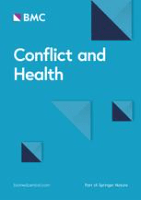
Conflict and Health
Scope & Guideline
Advancing Knowledge for Health in Conflict Zones
Introduction
Aims and Scopes
- Health Systems Resilience and Response:
Research focusing on how health systems adapt and respond to challenges posed by conflict and humanitarian emergencies, including the evaluation of healthcare delivery models and the resilience of health infrastructures. - Mental Health and Psychosocial Support:
Exploration of mental health issues and psychosocial interventions in conflict settings, emphasizing the psychological impact of war on individuals and communities, particularly vulnerable populations like refugees and internally displaced persons. - Violence Against Healthcare:
Investigations into the prevalence and implications of violence against healthcare workers and facilities in conflict zones, addressing the barriers to healthcare delivery and the safety of healthcare professionals. - Refugee and Displaced Populations' Health:
Studies on the health outcomes and healthcare access for refugees and displaced individuals, focusing on integration into host country health systems and the unique challenges they face. - Global Health and Humanitarian Action:
Research on the intersection of global health diplomacy and humanitarian action, examining the role of international organizations and policies in addressing health needs in conflict-affected areas. - Infectious Disease and Public Health Challenges:
Analysis of the impact of armed conflict on the spread and management of infectious diseases, highlighting the challenges faced in vaccination, disease surveillance, and healthcare provision. - Nutrition and Food Security:
Research addressing malnutrition and food insecurity in conflict settings, exploring the determinants and consequences of dietary challenges faced by affected populations.
Trending and Emerging
- Telehealth and Remote Interventions:
The rise of telehealth solutions and remote psychological interventions in humanitarian settings has gained considerable attention, especially in light of the COVID-19 pandemic, showcasing innovative approaches to healthcare delivery. - Integrated Approaches to Refugee Health:
There is an increasing focus on the integration of refugee health into national health systems, emphasizing the need for holistic strategies that address the health needs of displaced populations while considering local contexts. - Mental Health and Trauma-Informed Care:
Research on mental health, particularly trauma-informed care strategies for populations affected by conflict, is increasingly prominent, reflecting a broader understanding of the psychological impacts of violence. - Health Equity and Social Determinants:
Emerging studies are delving into health equity and the social determinants affecting health outcomes in conflict zones, highlighting the importance of addressing systemic inequalities and promoting inclusive health policies. - Community-Based Health Initiatives:
There is a growing trend towards community-based health initiatives that empower local populations and utilize participatory approaches to improve health outcomes, demonstrating the value of local knowledge and involvement. - Impact of Climate Change on Health in Conflict Areas:
Research exploring the intersection of climate change and health in conflict-affected regions is emerging, as environmental factors increasingly contribute to health crises and humanitarian challenges.
Declining or Waning
- Traditional Epidemiological Studies:
There has been a notable decline in traditional epidemiological studies focusing solely on mortality and morbidity rates in conflict zones, as the journal shifts towards more qualitative and intervention-focused research. - Basic Health Service Delivery:
Research specifically centered on the basic delivery of health services without the integration of broader social and political contexts is waning, as there is a growing recognition of the need for comprehensive approaches that include psychosocial and community-level factors. - Non-communicable Diseases (NCDs) in Conflict Settings:
Although still relevant, studies specifically addressing NCDs in conflict settings are less frequent, suggesting a shift in focus towards immediate health crises and infectious diseases exacerbated by conflict. - Historical Perspectives on Conflict Health Issues:
Research that takes a purely historical view of health issues in conflict areas has seen a decline, as current and actionable insights are prioritized over retrospective analyses. - Gender Studies in Isolation:
While gender-based violence remains a significant topic, studies focusing on gender issues in isolation, without connecting them to broader humanitarian or health system challenges, are diminishing.
Similar Journals

Healthcare
Fostering collaboration for transformative health advancements.Healthcare is an esteemed academic journal published by MDPI, dedicated to advancing the field of health and medical sciences since its establishment in 2013. Operating from Switzerland, this Open Access journal aims to provide a platform for high-quality research that spans critical disciplines such as Health Informatics, Health Information Management, Health Policy, and Leadership and Management. With a 2023 Impact Factor reflected in its Q3 and Q2 rankings across various categories, Healthcare not only offers visibility and accessibility to innovative research but also fosters collaboration among researchers, professionals, and students dedicated to improving global health outcomes. The journal's commitment to disseminating knowledge and its diverse range of topics make it an essential resource for anyone involved or interested in the continuous evolution of health systems and practices, positioning it as a vital contributor to the future of health research.
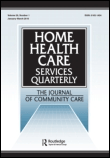
HOME HEALTH CARE SERVICES QUARTERLY
Unlocking Insights for Enhanced Home Care SolutionsHOME HEALTH CARE SERVICES QUARTERLY, an esteemed publication by Taylor & Francis Ltd, has been a cornerstone of scholarly discourse in the fields of community and home care since its inception in 1979. With ISSN 0162-1424 and E-ISSN 1545-0856, this quarterly journal promotes rigorous research and innovative practices in home health care services, significantly impacting health policy and public health discussions. The journal enjoys a respectable Impact Factor, reflecting its contributions to the field, and currently ranks Q2 in Community and Home Care, along with Q3 status in both Health Policy and Public Health. Researchers, professionals, and students alike can benefit from the diverse range of articles that address practical challenges and emerging trends within the home health care industry. Although not an open-access journal, it continues to provide a vital platform for advancing knowledge and disseminating best practices essential for improving health outcomes. As it embarks on its journey towards 2024, it remains committed to fostering an inclusive dialogue that shapes the future of home health care.
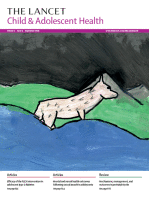
Lancet Child & Adolescent Health
Fostering Excellence in Child and Adolescent HealthLancet Child & Adolescent Health is a premier academic journal published by Elsevier Scientific Ltd, focusing on groundbreaking research in the fields of Developmental Psychology and Pediatrics. Since its inception in 2017, the journal has quickly gained prominence, evidenced by its remarkable ranking in the Q1 quartile across both its disciplines and its impressive Scopus rankings, placing it in the 99th percentile of Developmental Psychology and Pediatric research. With an emphasis on enhancing child and adolescent health outcomes through high-quality, peer-reviewed articles, the journal serves as an essential platform for researchers, healthcare professionals, and academics. Although it operates without open access, the impact of this journal extends globally as it bridges the gap between innovative research and practical application in clinical settings, elucidating the ever-evolving landscape of child and adolescent health. It is located in the vibrant academic environment of the Netherlands, providing a crucial repository for knowledge aimed at transforming practices and improving well-being for younger populations.

Health Services Research and Managerial Epidemiology
Bridging research and practice for better health outcomes.Health Services Research and Managerial Epidemiology is an esteemed peer-reviewed journal published by SAGE Publications Inc, dedicated to advancing the fields of health services research and epidemiology. With the ISSN 2333-3928, this Open Access journal, available since 2014, aims to foster a deeper understanding of the managerial aspects of epidemiology and its implications for health service delivery. By offering insights into critical healthcare policies and practices, the journal serves as an important resource for researchers, practitioners, and students alike. As of 2023, it is classified in the Q3 quartile for both Epidemiology and Health Policy, ranking within the 31st and 30th percentiles, respectively, in Scopus rankings. The journal’s scope encompasses a wide variety of topics, ranging from health management practices to innovative research methodologies, making it a key platform for disseminating influential work that shapes health policy and public health strategies. Operating out of the United States, at 2455 Teller Rd, Thousand Oaks, CA 91320, it continues to push the boundaries of knowledge in an increasingly vital area of study.
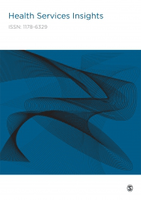
Health Services Insights
Advancing knowledge for better health outcomes.Health Services Insights is a prestigious, open-access journal published by SAGE Publications Inc. Based in the United Kingdom, this journal has become a vital resource for researchers and professionals in the fields of Health Policy and Public Health. Since its inception in 2008, Health Services Insights has consistently aimed to disseminate high-quality, peer-reviewed research that informs practice and policy in health service delivery and management. With an impressive Q1 ranking in both its categories as of 2023, and a respectable Scopus ranking positioning it within the upper percentiles of its fields, the journal continues to attract influential contributions from global experts. Its open-access format, established in 2013, ensures that vital insights on health services are accessible to all, facilitating knowledge sharing and collaboration among researchers, practitioners, and students alike. By focusing on impactful research and innovation, Health Services Insights plays a crucial role in addressing contemporary challenges in health services and improving health outcomes worldwide.
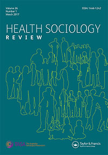
Health Sociology Review
Unraveling the Complexities of Health in a Social ContextHealth Sociology Review is a premier publication within the fields of health sociology and social sciences, dedicated to advancing knowledge and understanding of the complex interactions between health, society, and policy. Published by Routledge Journals, Taylor & Francis Ltd, this journal boasts an impressive impact factor, reflecting its high-quality research contributions and influential standing within the academic community. With Q1 rankings in both Health (Social Science) and Sociology and Political Science for 2023, it is recognized as a leading source of contemporary scholarship, currently indexed in Scopus with commendable rankings in its respective categories. The journal offers a platform for researchers, professionals, and students to publish original empirical research, critical reviews, and theoretical explorations that illuminate the social determinants of health and the implications for policy-making. Though it is not an open-access journal, it remains accessible through various academic platforms, ensuring widespread dissemination of its critical insights. The Health Sociology Review stands as an essential resource for those engaged in the vital interplay between health and society, marking its significance in shaping future discourse and research in the field.
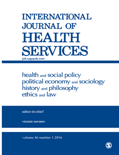
INTERNATIONAL JOURNAL OF HEALTH SERVICES
Empowering professionals with insights in health service delivery.The INTERNATIONAL JOURNAL OF HEALTH SERVICES, published by SAGE PUBLICATIONS LTD, stands as a vital resource for professionals and researchers in the field of health policy and management. Established in 1971, this journal has been instrumental in disseminating cutting-edge research, with a notable Scopus ranking of #65/270, placing it in the 76th percentile within its category. With its emphasis on empirical research and theoretical discussions, it aims to enhance the understanding of health service delivery systems globally. Though the journal's coverage has been discontinued in Scopus as of 2022, it continues to provide critical insights and facilitate scholarly conversation in the health services domain. Access to its articles is enable through various modes, allowing researchers and practitioners to stay informed on the latest developments and trends in health policy. The INTERNATIONAL JOURNAL OF HEALTH SERVICES not only serves as an academic forum but also as a catalyst for improving health outcomes through informed policy decisions.

Comunidad y Salud
Championing research that transforms community well-being.Comunidad y Salud is a noteworthy academic journal published by the Universidad de Carabobo, dedicated to the field of public health and community well-being. With the ISSN 1690-3293, this journal serves as a crucial platform for disseminating research focused on health promotion, community engagement, and the socio-economic determinants of health within diverse populations. It aims to foster interdisciplinary dialogue and collaboration among professionals, researchers, and students interested in improving public health outcomes. Although it does not operate under an open access model, the journal's rigorous peer-review process ensures the publication of high-quality research that contributes significantly to the advancement of community health practices in Venezuela and beyond. By bridging theory and practice, Comunidad y Salud plays an essential role in shaping health policies and practices that impact local communities.
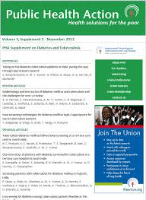
Public Health Action
Advancing public health knowledge for a healthier tomorrow.Public Health Action, published by the International Union Against Tuberculosis and Lung Disease (IUATLD), is a pivotal open-access journal dedicated to advancing knowledge and practice in the fields of public health and health policy. Since its inception in 2011, the journal has provided a platform for innovative research and impactful discussions that shape the future of public health, with an emphasis on combating tuberculosis and other communicable diseases. With an ISSN of 2220-8372 and a presence in Scopus, the journal is ranked #110 in Health Policy and #249 in Public Health, Environmental and Occupational Health, showcasing its commitment to quality and relevance in its field. Housed in Paris, France, Public Health Action invites researchers, professionals, and students to explore cutting-edge research that informs policy and practice and contributes to the global fight against diseases. By offering open access to its content, the journal ensures that vital information remains accessible to a diverse audience, fostering collaboration and innovation worldwide.

NATIONAL MEDICAL JOURNAL OF INDIA
Shaping the future of healthcare with cutting-edge research.NATIONAL MEDICAL JOURNAL OF INDIA, ISSN 2583-150X, is a premier scholarly journal published by SCIENTIFIC SCHOLAR LLC that has been contributing to the field of medicine since its inception in 1988. With a dedicated focus on the diverse aspects of healthcare in India, this journal serves as a vital platform for researchers, healthcare professionals, and students alike, promoting evidence-based practices and innovative findings within the medical community. Although it is currently categorized at Q4 in Medicine (miscellaneous) with a Scopus rank of #449 out of 636, its commitment to fostering local and global discourse on pivotal medical issues and research cannot be understated. The journal’s broad scope and its aim to provide contemporary discussions are crucial in advancing knowledge and improving patient care in varied medical domains. By offering comprehensive access to a wealth of medical research, NATIONAL MEDICAL JOURNAL OF INDIA stands as an essential resource for all stakeholders invested in the development of the medical field in India and beyond.